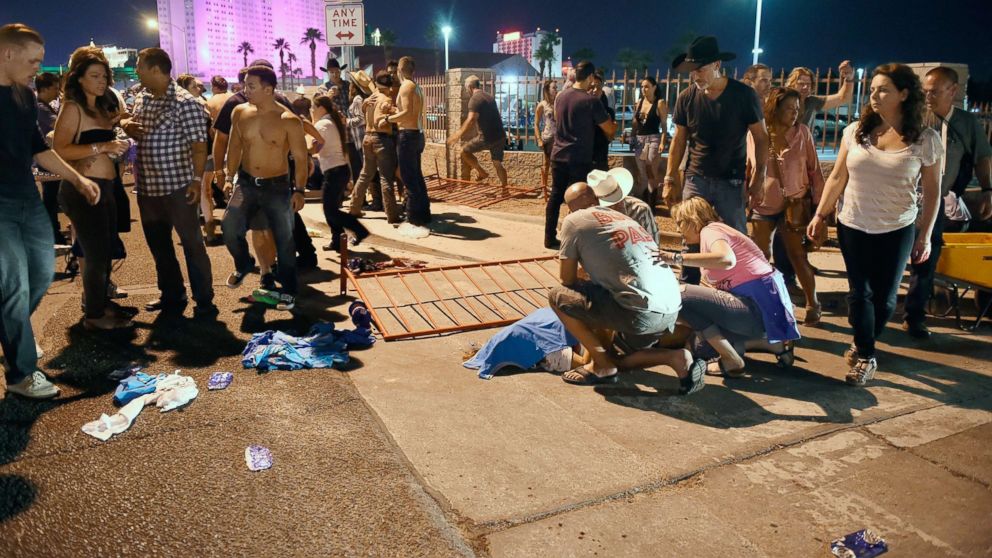The anatomy of the Las Vegas mass shooting, the deadliest in modern US history
Rosemarie Melanson remembers staring down at the chaos breaking out at the Route 91 Harvest Festival, seeing her limp body splayed on the ground, blood coming from a bullet wound to her chest. She recalls floating in the sky away from frantic screams and the rain of gunfire that instantly obliterated what had been an awesome autumn night on the town with her two daughters.
"The next thing I know I was in heaven," Melanson told ABC News' "Nightline." "And I saw my dad and my two brothers, and my uncle. And it was so beautiful. It was so beautiful you didn't want to come back. They just told me, 'It's not your time, Rosemarie. You've got to go back.'"
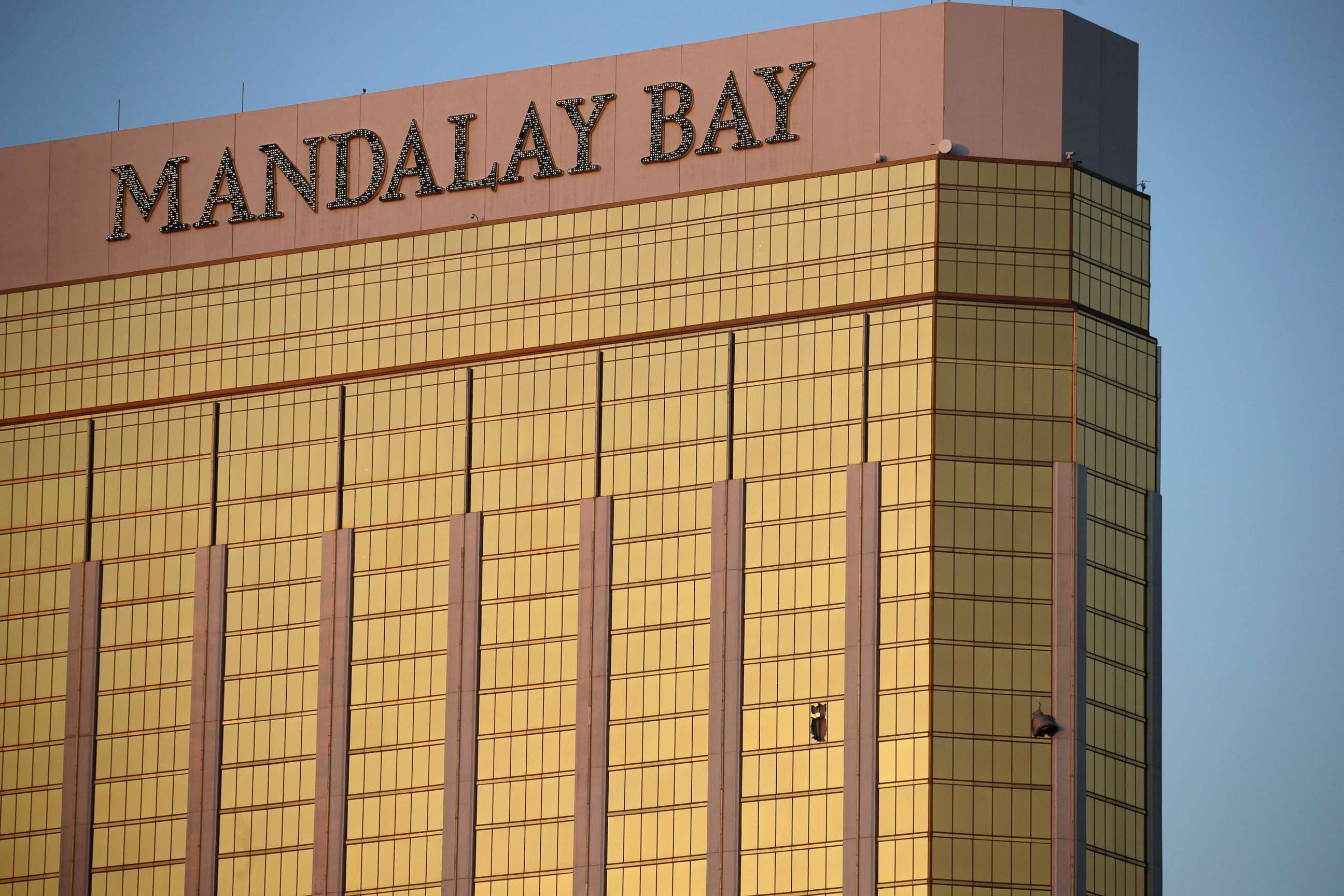
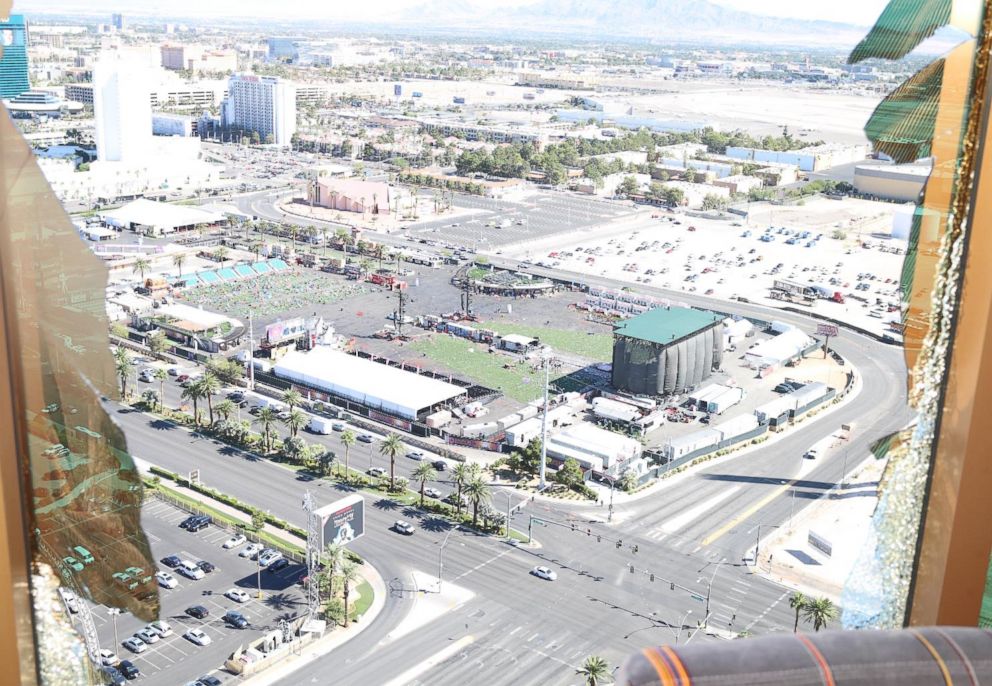
Watch the full documentary "A Killer on Floor 32" on Hulu right now.
ABC News' "Nightline" is set to air one of the most comprehensive examinations of a U.S. mass shooting ever compiled, a look back at the Oct. 1, 2017, Las Vegas massacre that killed 58 people and left Melanson and more than 850 others wounded at a country music concert.
A killer on the 32nd floor
Stephen Paddock checked into the Mandalay Bay on Sept. 25, 2017, arriving just before 3 p.m. after making the normally 70-minute drive in his new Hyundai Tucson SUV from his home in Mesquite, Nevada, about 74 miles northeast of Las Vegas.
The 64-year-old former accountant and realtor who had once amassed a $2.1 million fortune was a regular at the hotel and considered a high roller designated for VIP treatment.
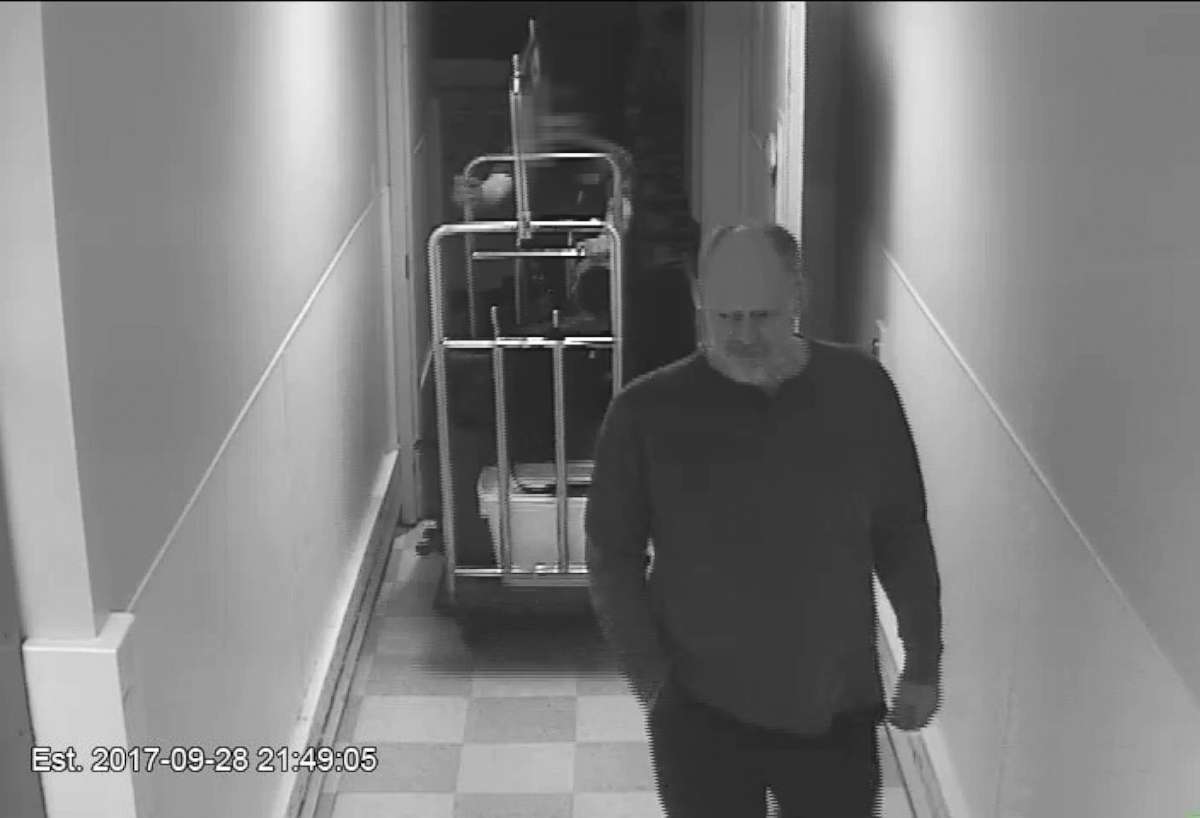
"He was a very typical guest," said Steven Martinez, senior vice president of global security for MGM Resorts, which owns the Mandalay Bay. "He was, in our estimation, the lowest risk type individual that would come onto our property."
Paddock was given top-shelf service, allowing him to ride up a service elevator to his room with his luggage and accompanied by a bellhop. During his stay at the Mandalay Bay, he made several trips to his home, returning each time with more bags.
In all, he brought in 21 suitcases, authorities said.
He was checked into suite 32-135 on the 32nd floor, a 1,700-square-foot corner space featuring floor-to-ceiling windows offering a wraparound view overlooking the famed Las Vegas Strip. He later reserved an adjoining suite, 32-134, using the name of his girlfriend, authorities said.
A plethora of security cameras at the resort practically recorded Paddock's every move outside his hotel suite.
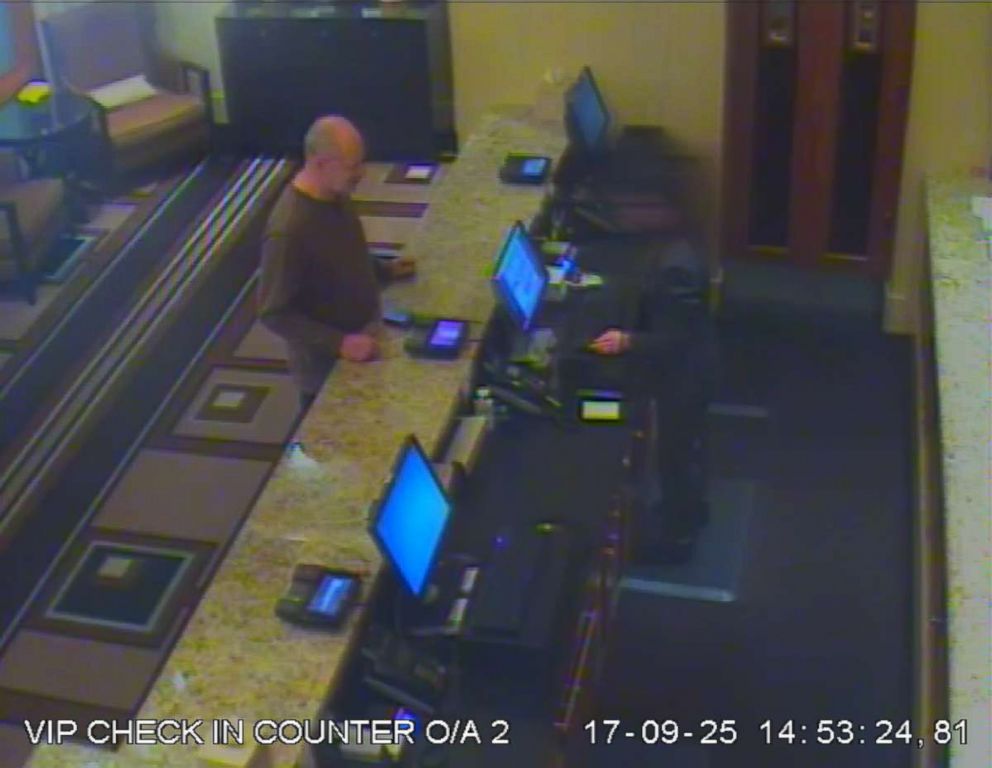
Surveillance footage showed him walking through the hotel's marbled-floor lobby, making a purchase in the gift shop, riding the elevators, sitting at slot machines and video poker machines.
"Everything he did is what you'd expect a normal guest to do: Using food and beverage, restaurants, having things delivered to his room," Martinez said. "He preferred to play video poker machines. He'd stay at that for hours on end."
Deputy Chief Andrew Walsh of the Las Vegas Metropolitan Police Department told "Nightline" that Paddock did nothing to stand out. He was just one man in a sea of thousands of hotel guests.
"He just looks like a middle-aged guy with a lot of luggage goin' up to his room," Walsh said.
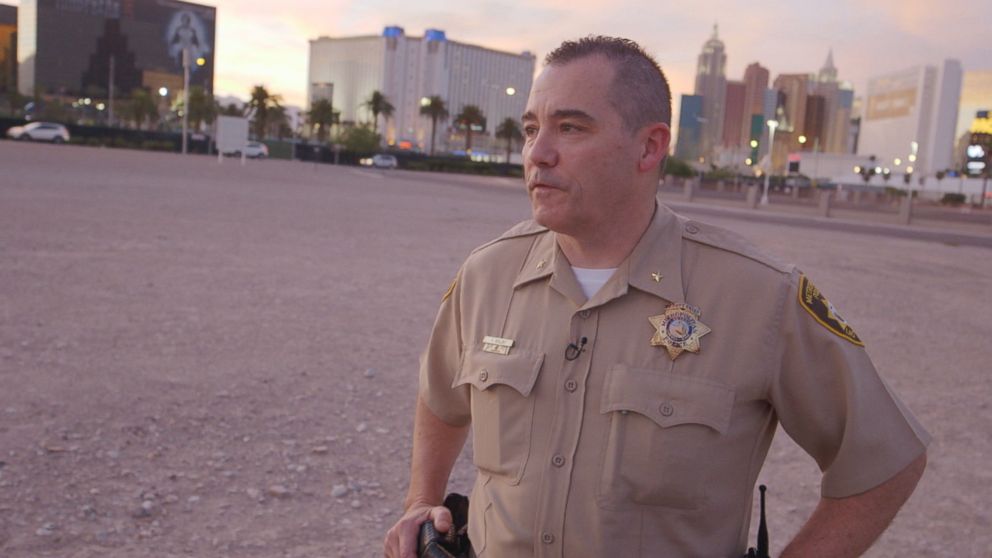
On Oct. 1, 2017, Paddock ordered room service and records show that between 2:23 p.m. and 9:40 p.m. he opened and closed the doors to both suites several times.
'When She Says Baby'
Jason Aldean, the country music star whose first eight albums have scored gold or platinum sales figures, had taken the stage around 9:40 that night. The former truck driver was now the closing act of the three-day Route 91 Harvest Festival at an open-air venue across the Las Vegas Strip from the Mandalay Bay, and many in the crowd of 22,000 were singing along to his hit "When She Says Baby."
Some days it's tough just gettin' up. Throwin' on these boots and makin' that climb, the song goes.
But before Aldean could finish the first verse, he was interrupted by something that sounded at first like firecrackers. Within seconds, the noises grew rapid and soon everyone, including Aldean, recognized the staccato of gunfire.
The time was 10:05 p.m.
"Somebody's shooting!" a concertgoer yelled. "Oh my God, I'm so ... scared."
People began to duck and cover. Others dove atop loved ones and petrified strangers, using their bodies as human shields.
In less than a minute, more than 100 rounds rained down on the crowd.
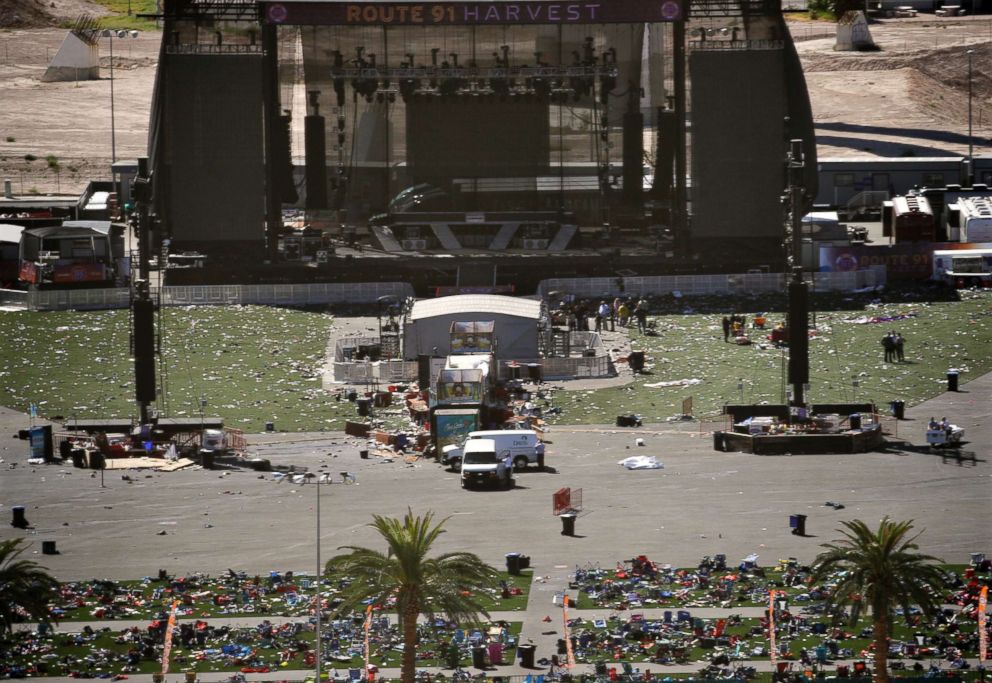
"People went in multiple directions, but not knowing where the rounds were coming from," said Walsh, the captain in command of the downtown Las Vegas division the night the rampage was perpetrated on his turf.
Alarm on the 32nd floor
Jesus Campos, a security guard at the Mandalay Bay, was poised to wrap up his shift when he received a call to check out a room alarm on the 32nd floor.
"This was the last call of my night," he said. "In my head, I was home free after this."
Campos was doing his rounds when he received the call to investigate the alarm one floor above him. He decided to take the stairwell to the 32nd floor. There he discovered something unusual: A metal L-bracket had been screwed to the door and doorjamb preventing him from opening it.
He said he walked up to the 33rd floor and took the elevator back down.
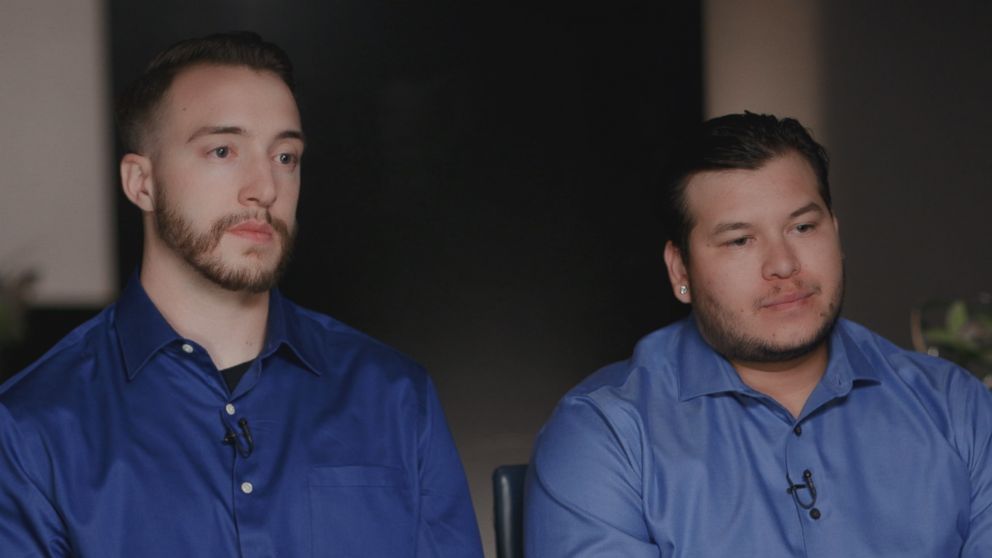
"I didn't know what was going on just simply because that's not normal," he said of finding the L-bracket. "I had to call our security dispatch."
His call, he said, was transferred to maintenance engineering.
When he entered the 32nd-floor hallway, Campos, who was unarmed, heard what sounded like a drill coming from behind the doors at the far end of the hall inside suite 32-135.
As he stepped in the direction of the strange noise, gunfire erupted. Someone barricaded in the high-roller suite somehow saw him coming and opened fire through the door.
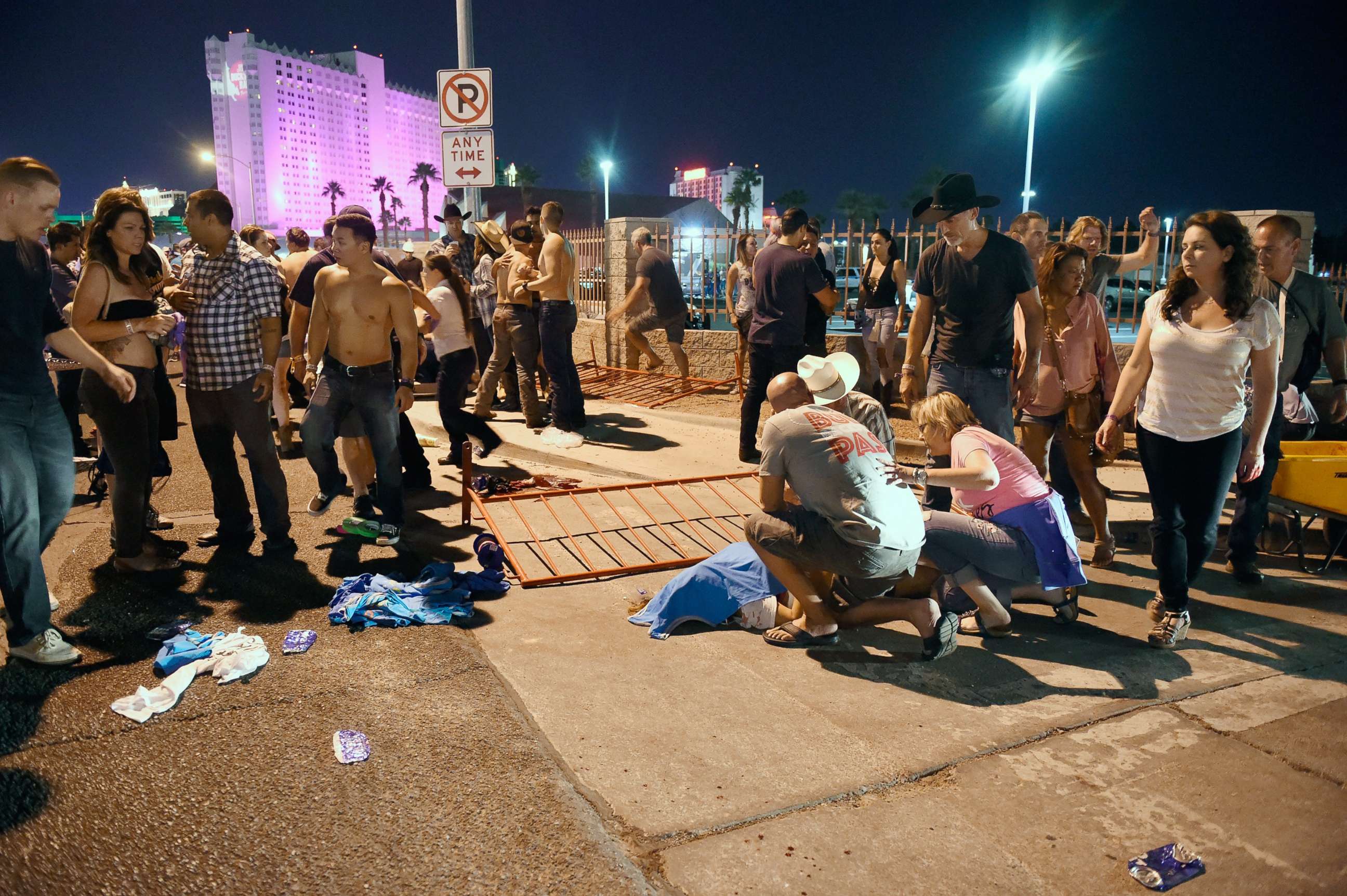
"I was struck and I went to get cover," Campos said. "I had to take a moment to realize what was going on. I went to lift up my pant leg and I saw the blood coming down."
Finding cover in an alcove, Campos radioed for help at 10:06 p.m.
"Hey, there's shots fired in 32-135," he reported.
The original alarm call turned out to be a nanny who had left her room door ajar. Had that not occurred, Campos would not have stumbled upon the massacre at the precise moment it was commencing.
He inadvertently became a hero by pinpointing the exact location of the shooter.
At 10:08 p.m., Stephen Schuck, a Mandalay Bay maintenance engineer, got off an elevator on the 32nd floor. He had been relayed Campos' report that an L-bracket was blocking an exit door and went to check it out.
"I had no idea what was going on at the time," Schuck told "Nightline."
When he exited the elevator, Schuck heard what sounded like a "jackhammer."
"I noticed him," Campos said of Schuck. "I said, 'Get cover. It's not safe.' At that moment in time, there were more rounds being dispersed."
Schuck dove for cover as bullets whizzed down the hallway toward him. He said he radioed for help.
"I thought if I don't come out of the hallway alive, I wanted to communicate for Metro [police] and first responders to get up there because this is where the shooter is," Schuck said.
'It's an active shooter'
Panicked concertgoers flooded the 911 dispatch center with calls.
"There are numerous reports coming in. We have 33 calls holding," a 911 dispatcher said over an emergency channel, according to a recording of radio transmissions. "It's an active shooter."
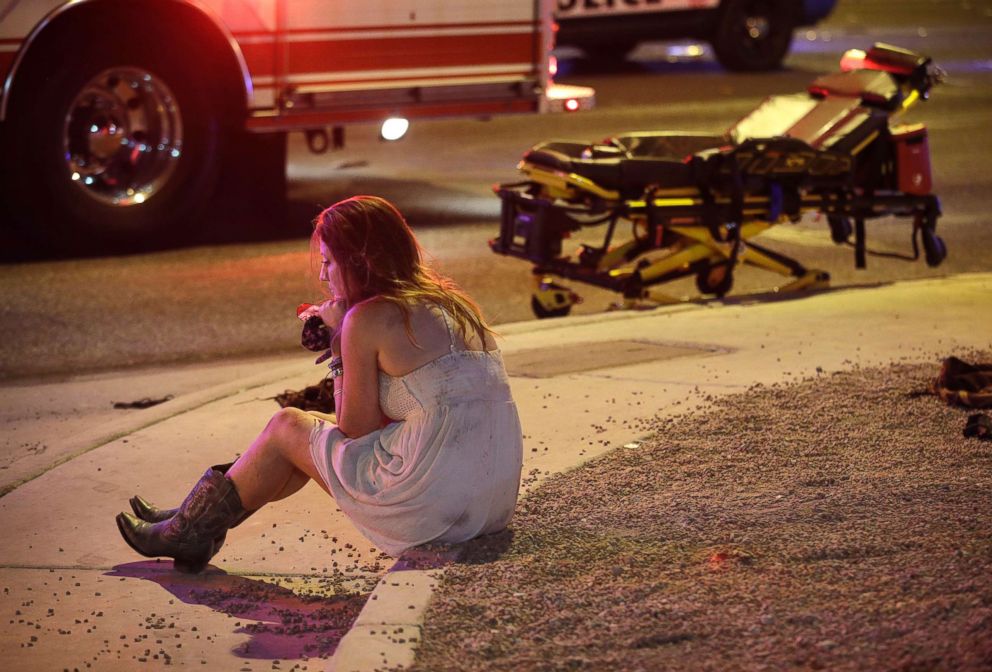
After being temporarily distracted by Campos and then Schuck, the gunman in suite 32-135 returned to his perch in the frame of a shattered window of the suite and let loose another barrage of gunfire on the concertgoers below.
Officer Brady Cook of the Metropolitan Police Department was one of the first officers to arrive on the scene. Video from another officer's bodycam caught the moments Cook and his colleagues came under fire and took cover behind their vehicles.
"I'm down! I got shot!" Cook is heard on another officer's bodycam screaming.
The 911 dispatchers were receiving unconfirmed reports of shooters in multiple hotels, including the Tropicana Las Vegas Casino Hotel Resort, one of the oldest hotels in the city, where scenes from "The Godfather" and Elvis Presley's "Viva Las Vegas" were filmed.
"What sticks with me is that fear, that pain in my stomach that this was going to just be the first part of a multifaceted attack," Walsh said.
In the confusion, armed security guards at the Mandalay Bay initially thought the gunfire was coming from outside and exited the hotel in search of the shooter.
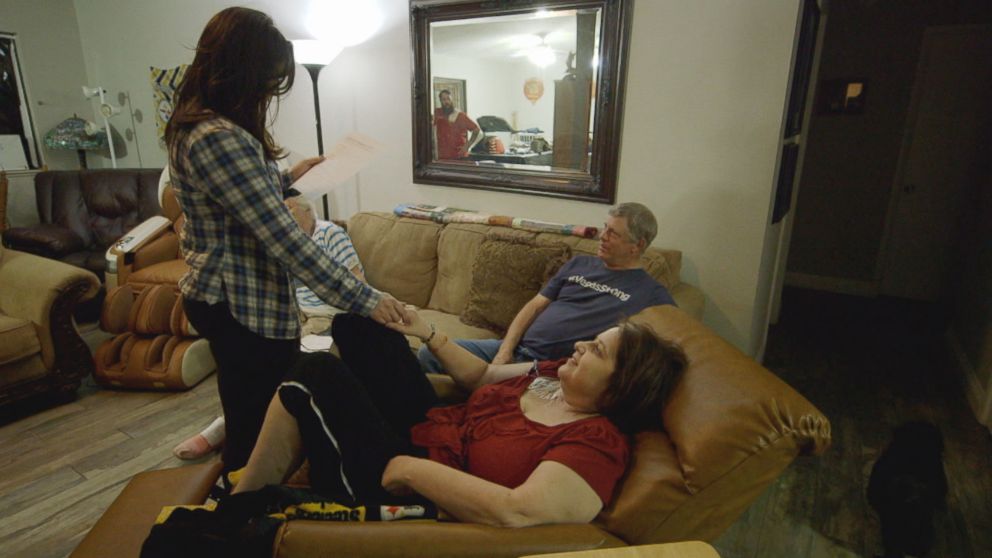
Meanwhile, the victims remained sitting ducks as the ground around them thudded with bullets.
Rosemarie Melanson had attended the concert with her adult daughters, Stephanie and Paige, the co-founders of a dance studio who had given their mom a ticket to the music festival as a Mother's Day present. The sisters were faced with a daunting decision: Stay with their gravely wounded mother and possibly die, or run for their lives.
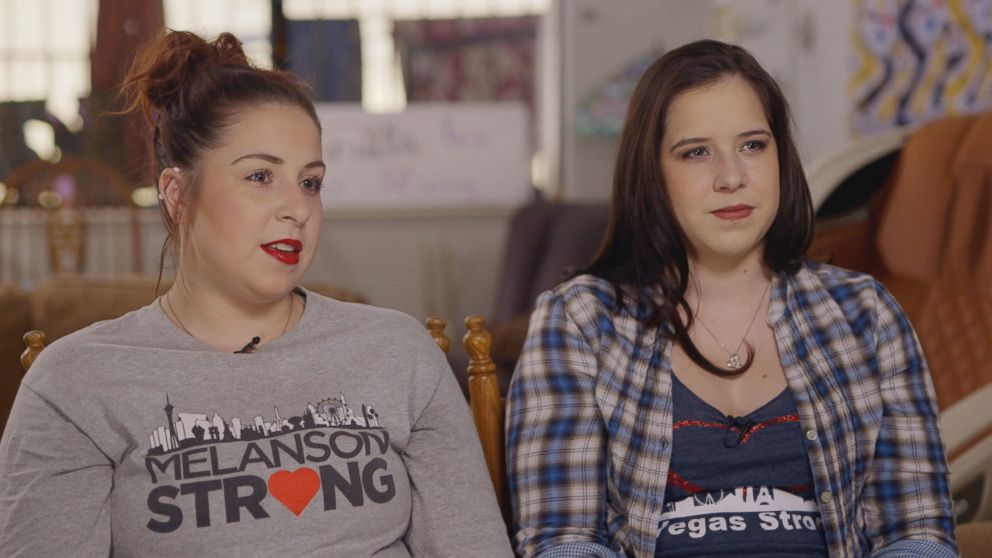
"A retired firefighter came over and he told us we had to go," said Paige Melanson, who was wounded in the arm. "He said that if we wanted to live that we needed to go. I looked into his eyes and he said, 'You need to go.' So I did."
Shift change
Officer Richard Cole and his rookie trainee Officer Brandon Engstrom, on only his second day on the job, had just reported for duty.
"It was our sergeant who had the radio on. Shots came out over the radio," Engstrom told "Nightline." "So immediately he yells at us to go to our cars, get ready and go to the concert venue."
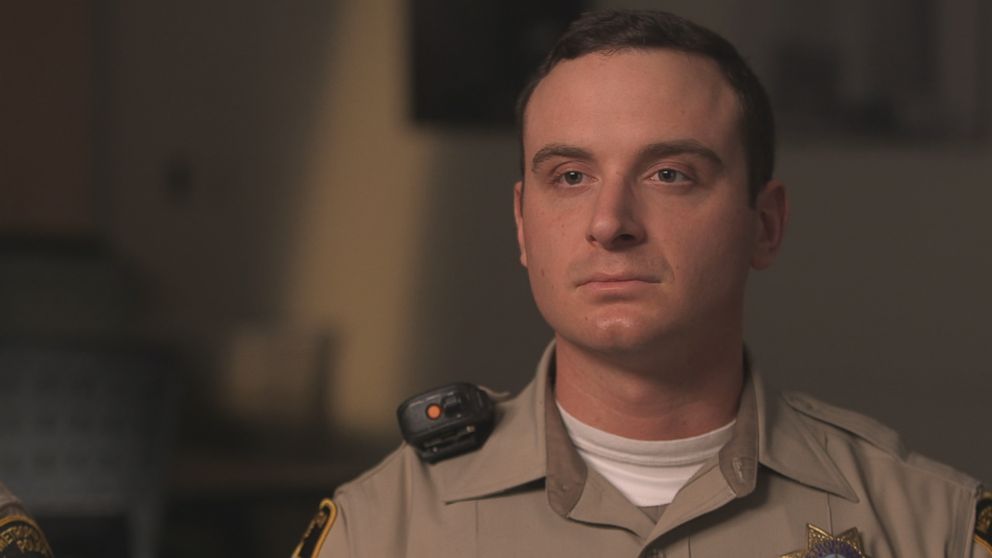
As Engstrom and Cole raced to the scene, a colleague radioed a foreboding warning: "Be aware, it is automatic fire, fully automatic fire from an elevated position. Take cover."
Every time an officer keyed a radio mic, the sound of rapid gunfire could be heard, the officers said.
As soon as Engstrom and Cole arrived at the scene, a man rushed up to them holding his wounded wife.
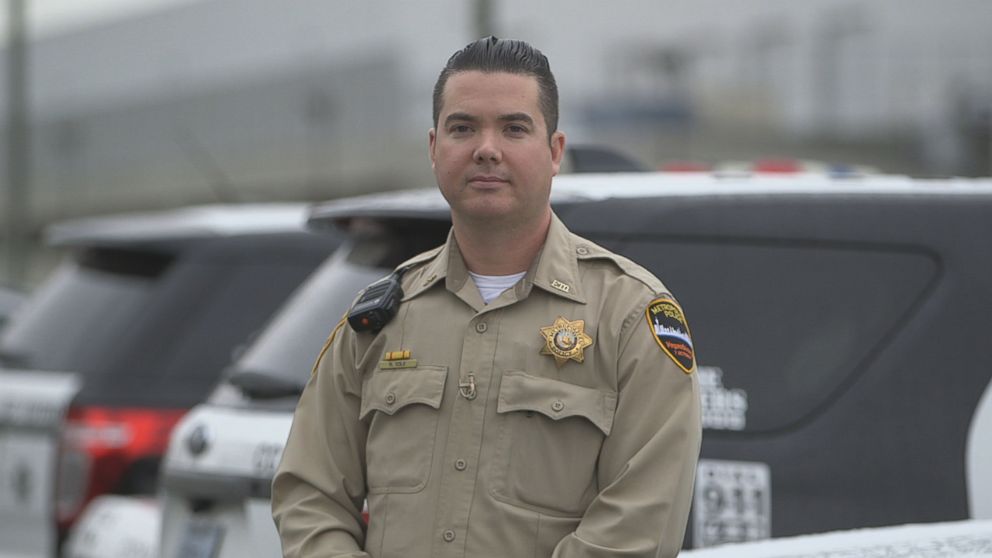
"He came over to our car and he's carrying his wife, Jovanna, in his arms and he says, 'Help me, I'm a police officer,'" Cole said.
Frank Calzadillas, an officer for the Salt River Police Department in Arizona, had traveled to Vegas with his wife, Jovanna, to attend the concert. During the massacre, Jovanna was shot in the head and Cole and Engstrom clearly understood she wouldn't survive unless they got her to a hospital immediately.
The officers put the couple in the back seat of their patrol vehicle and sped to University Medical Center in Las Vegas.
Frank Calzadillas was doing chest compressions on his wife, pleading with her to stay alive.
Cole said that as they raced to the hospital, they heard of Cook, who was also on his second day of work, being shot.
"I remember within the first 30 seconds to a minute of us driving to the hospital, we heard that an officer had been shot and Brandon [Engstrom] realized that was somebody he went to the academy with," he said. "And I remember him saying, 'My buddy just got shot.'"
Police bodycam video showed the officers pulling up to the crowded emergency room and carrying Jovanna Calzadillas inside, asking doctors and nurses, "Where do you want her?"
"At that point ... she was bleeding everywhere, like her entire body was covered in blood," Cole said.
After laying the wounded woman on a gurney, Cole and Engstrom decided what to do next.
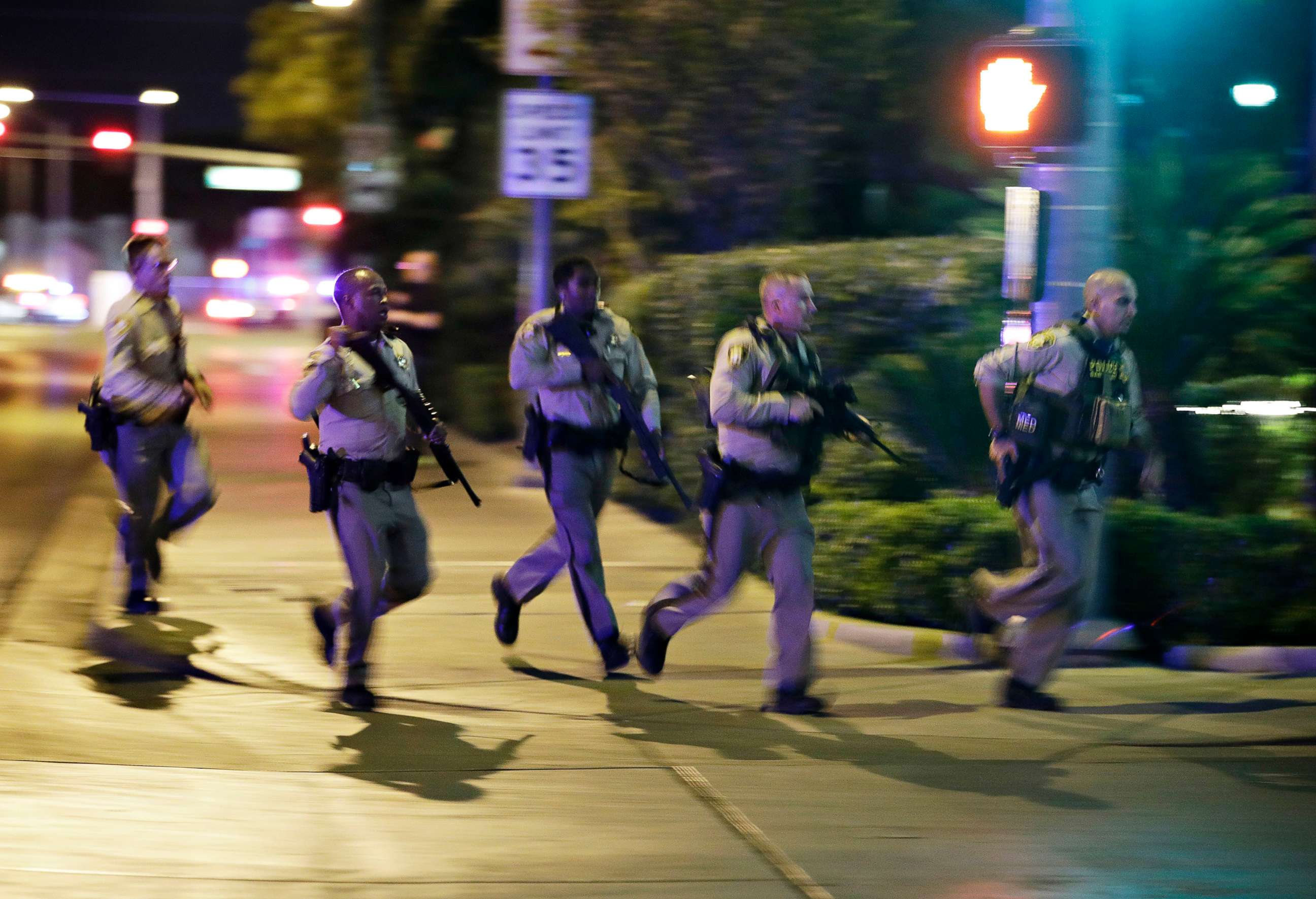
"I'm washing my hands and I said something to the effect, 'It's an effing terrorist attack. Just get everybody here.' I then ... looked at Brandon and he said, 'What are we doing?'" Cole recalled. "I said, 'Let's go. We've got to go back.'"
Possible booby trap
Once authorities were aware of the shooter's location at the Mandalay Bay, police conducted a full sweep of the hotel.
"Show me your hands! Show me your hands!" one officer was heard in bodycam footage yelling as he and his well-armed team fanned out in the casino, clearing gamblers from row after row of flashing and ringing slot machines.
Police SWAT teams were going floor to floor in the gilded 43-story tower, bursting into rooms with guns drawn and rousting guests.
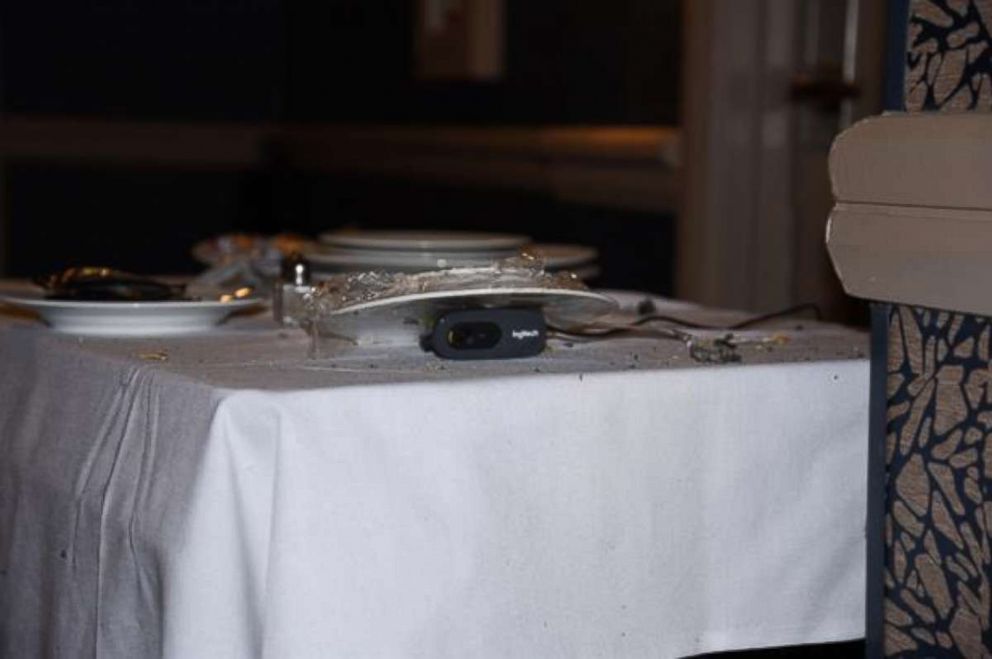
"There is an active shooter in the hotel, OK. Stay locked in your room. Thank you," an officer is heard in a bodycam video telling a startled guest still in bed.
When SWAT teams made it to the 32nd floor, they were confronted by an eerie silence and a room-service cart parked outside of suite 32-134 with wires coming out of it.
"What is that cart that's in the hallway?" one of the officers asked.
Another officer replied, "I don't know. That's why you're not going any farther."
"They get close enough to that room, there's wires, there's cameras. What are they walking into? Is that an IED? Is there more than one person? How many people are there? We had nothing," said Deputy Chief Walsh.
On closer inspection, the officers saw the room-service cart was rigged with a small surveillance camera hidden under a plate and pointed down the hallway at them.
They dismantled the overhead lights to give them cover and placed a bomb strip to the door of the suite.
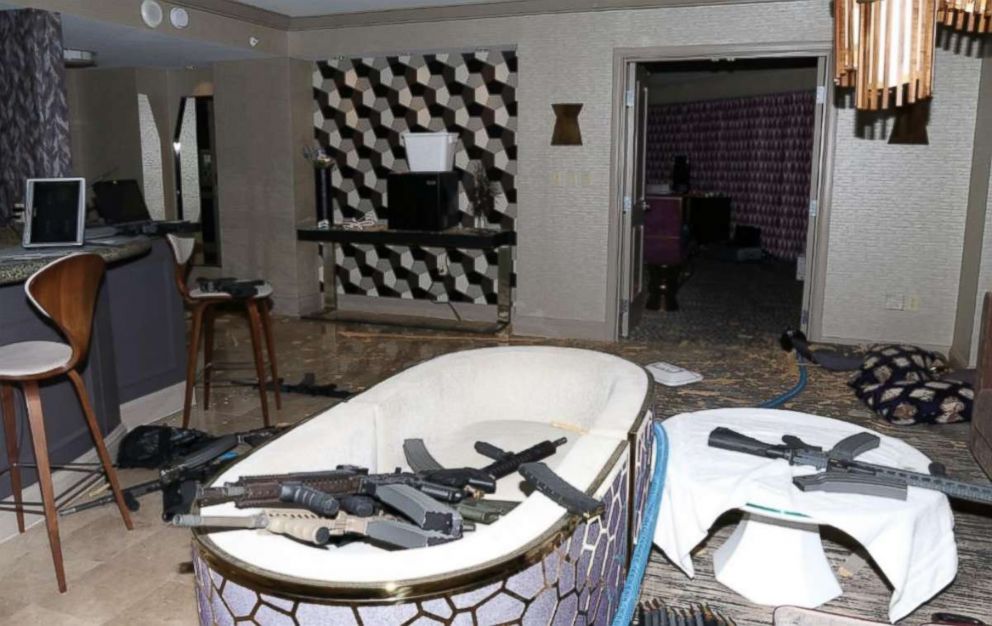
"Stand by for breach!" one of them yelled, prompting others to cover their ears.
"Breach! Breach! Breach!" the orders came followed by an explosion.
When they entered the room, they found Paddock dead from a self-inflicted gunshot wound.
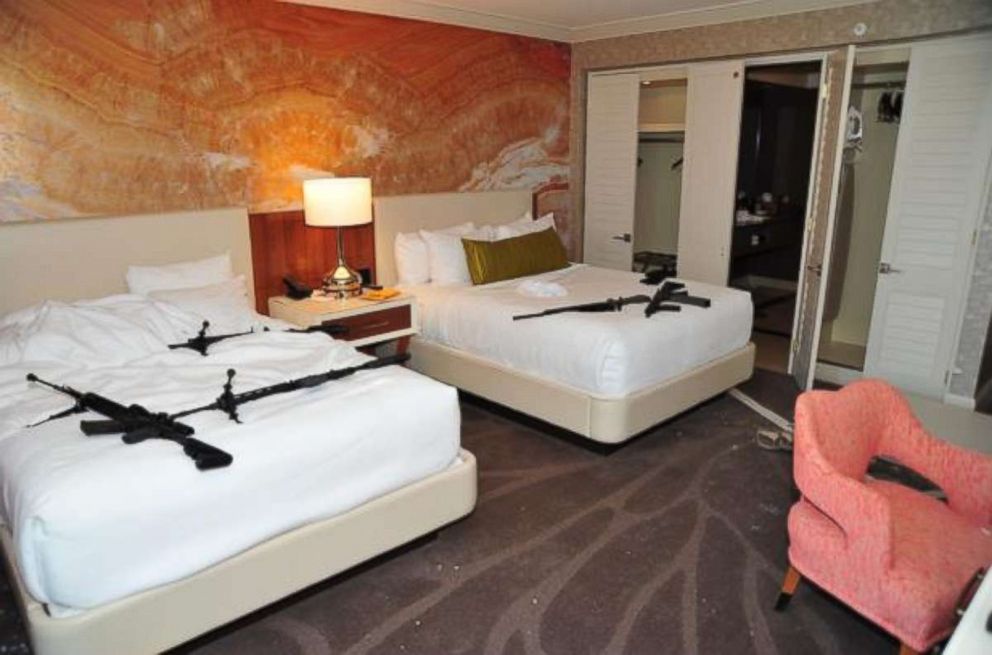
The suite was littered with more than 1,000 spent gun shell casings and an arsenal of weapons, some lying on the beds and on the floor, others stacked in a bathtub. A small surveillance camera had been fitted over the peephole of the suite's entrance door.
The officers blasted open the door to the adjoining suite, the one Paddock had booked under his girlfriend's name days earlier, and found more weapons there.
In total, police seized 24 guns, including AR-15 and AR-10 assault rifles with armor-piercing bullets. Some of the weapons had been altered with bump-stocks, devices to make them simulate machine guns.
Police also found over 5,000 unused rounds of ammunition.
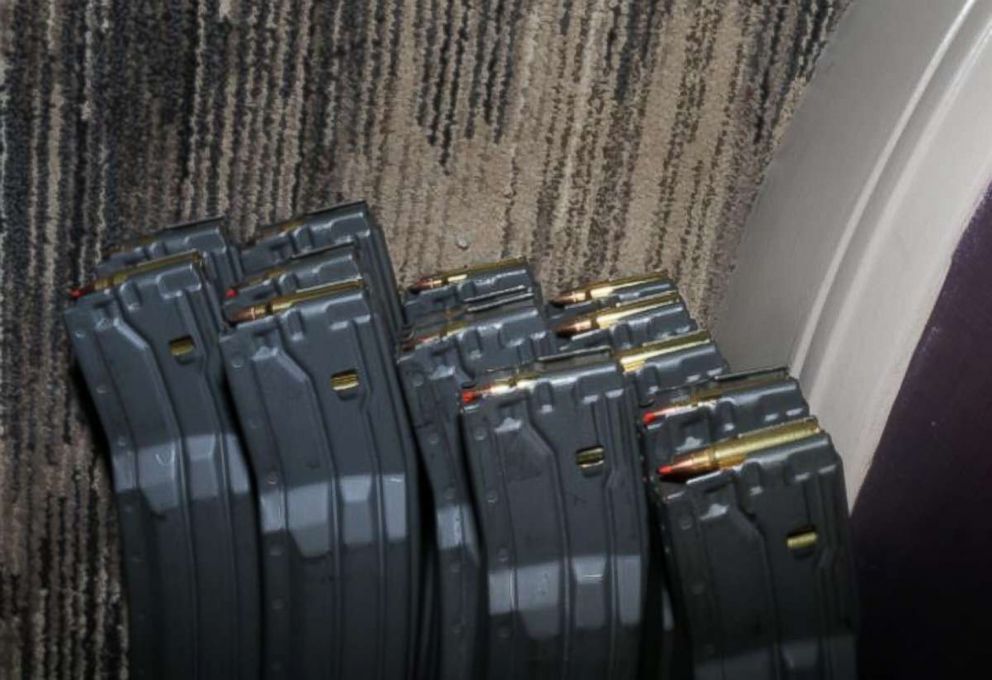
As word spread through the hotel that the gunman was dead, one officer addressed a crowd of hotel guests sheltering in place.
"We have no control over the actions of evil people, but we're here now," the officer said.
The room broke into loud applause.
'An act of terrorism'
Since the shooting, the Mandalay Bay has instituted new security measures, including using K-9 units to conduct random checks of luggage, Martinez said.
Deputy Chief Walsh said the hotel has also boosted its scrutiny of guests, including evaluating who can check into rooms overlooking outdoor venues both on the Las Vegas Strip and downtown.
"They've been great partners for us," he said of the casino industry.
But not everyone agrees.
Mandalay Bay and MGM officials have argued in court filings that the mass shooting was clearly an act of terrorism and because of that, they should not be held legally responsible.
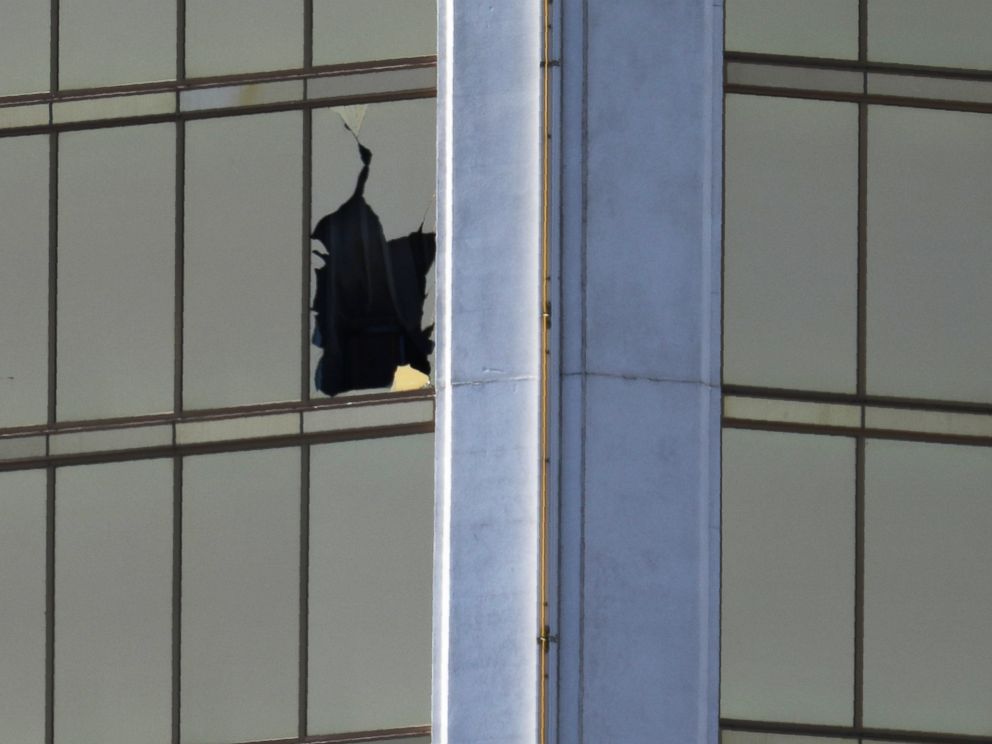
The company has even taken the controversial step of suing more than 1,000 victims of the attack to escape financial liability. Citing a law passed after the Sept. 11, 2001, terrorist attacks, the company argues it is not financially responsible because the security company it hired for the concert was federally certified against terrorist attacks.
Responding to a backlash from the lawsuit, MGM lawyers contend it is simply a legal maneuver and not meant to insult those injured or killed.
"This is a small city and it's a big family," Bowling told "Nightline." "The community depends on Mandalay Bay. We're a community serving a community. And so, this is our focus: We can mourn what's going on, but we can work together to look to the future, and that there's hope."
The lawsuit is currently suspended while MGM and the survivors attempt to resolve their differences in mediation.
Asked how Paddock could sneak that many weapons into the hotel, Chuck Bowling, president and chief operating officer for the Mandalay Bay, said he was treated as any other guest.
"My first response to that is there are thousands of people walking through the front door, our back door, from the parking garage with luggage. We greet and welcome them. That's our first responsibility," Bowling told "Nightline."
"Once I saw the arsenal that was up there ... it's sickening," he said.
'Like sunshine to a dark day'
More than a year since the mass murder, investigators, survivors and the families of those slaughtered are left with one gnawing question above all others: What possessed a middle-aged retired accountant to commit the deadliest mass shooting in modern American history?
"Other places that have had mass casualty incidents ... the shooters ... have left behind manifestos. In this case, we just don't have that," Deputy Chief Walsh said.
The bullet that hit Rosemarie Melanson in the upper right chest, traveled sideways through her body, severing her esophagus, breaking several ribs, and tearing through her intestine, her liver and spleen. After 12 surgeries and months spent in and out of the hospital, she was finally sent home to recover six days before the one-year anniversary of the attack.
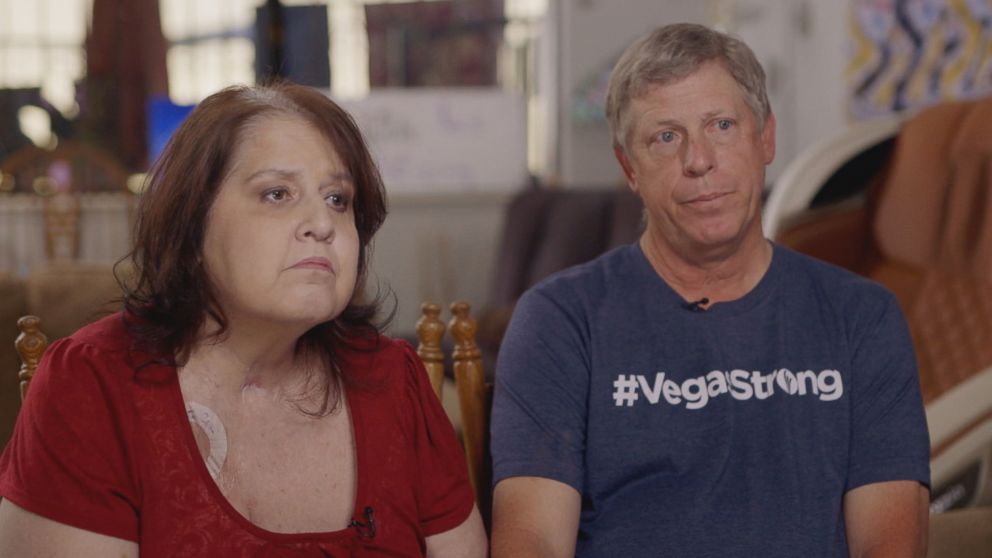
"I'm stronger than I thought I was," she said.
The U.S. Justice Department has allocated $17 million to assist those affected by the shooting.
Stephen Schuck, the Mandalay Bay maintenance engineer, said the shooting left him with a new appreciation for life.
"I feel like I got a second chance that 58 people didn't, and I need to live a good life to honor them," Schuck said.
On the morning after the mass shooting, officers Cole and Engstrom returned to University Medical Center to check on Officer Brady Cook and Jovanna Calzadillas, the critically wounded Arizona woman they drove to the hospital and whose blood stained their shirts.
"I thought for sure that she probably didn't make it," said Cole.
A nurse, however, directed them to the intensive care unit, where the woman was being treated. Calzadillas survived and is still undergoing rehabilitation today.
"They saved my life," Jovanna Calzadillas told "Nightline" of Cole and Engstrom.
Her husband, Frank, added: "There aren't any words to say how grateful we are for them or how much we appreciate everything they did. We just know there's nothing but love for those two guys."
Engstrom, now more than a year on the job, said hearing of Jovanna's survival was the most heartening news he and Cole received on what will likely be the most horrific day in both their law enforcement careers.
"Going to the hospital and learning that she's actually still alive," Engstrom said, "was kind of like sunshine to a dark day."
